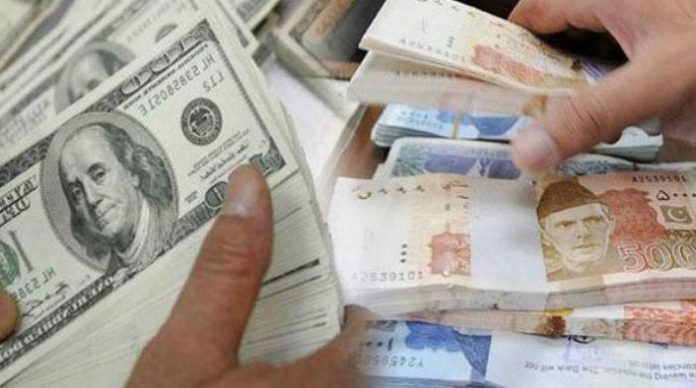KARACHI: The total foreign debt burden of the country swelled by Rs 85 billion after the decision of State Bank of Pakistan (SBP) to depreciate the local currency by 4.4 per cent in last four days.
“The recent depreciation in Pak rupee has increased our debt burden by Rs 390 billion,” said Arif Habib Securities Analyst Arsalan Hanif.
For the last two years, Pak-Rupee has almost remained stagnant but owing to the rising current account deficit, concerns regarding the balance of payments and an unfavourable position of reserves, pressure has been exerted on Pak rupee against the US dollar.
During last week, Pak rupee has depreciated by 4.4 per cent to Rs 110 from Rs 105.39. “This sharp depreciation in the parity can be beneficial as well as have an adverse impact on the economy,” the analyst said. Moreover, rising cost of imported products will heighten inflationary pressure although; it may also reduce the demand for certain imported items.
On the contrary, exporters will be encouraged to bring maximum foreign currency and reduce dependency on imported products as demand for local products get a boost. This leads us to revise our CPI-based inflation estimates given the country relies heavily on imports of palm oil, cooking oil, vegetable oil, mustard oil, pulses, grams, tea, motor vehicles, medicines, and petroleum products. Meanwhile increasing international oil prices coupled with rupee depreciation will increase transportation cost which will also directly impact the prices of local products as the higher cost will be passed on to consumers.
In 2008, we witnessed a significant jump in inflation from 8.0 per cent YoY in January 2008 to 22.0 per cent YoY in April 2009 on account of Balance of Payments crisis coupled with the global financial crisis unfolding as Pak rupee drastically depreciated by 33.3 per cent from 61.65 in January 2008 to 78.40 in October 2008. Likewise, policy rate moved in-line with inflation from 10 per cent in January 2008 to 15 per cent in November 2008 due to a significant rise in inflation from 8 per cent to 20 per cent during the period.
The correlation between rupee and inflation became more evident as rupee began to strengthen post-June 2009 and the stubborn inflation came sliding down concomitantly to a stable level.
There are several commodities like wheat, rice, sugar, cement and DAP which are already trading at premium prices compared to international prices, restricting the further increase in prices due to rupee devaluation. Wheat flour has a weight of 4.16 per cent in the CPI index, local price per kg is set at Rs 38.8 per kg (price details extracted from Sensitive Price Index compiled by Pakistan Bureau of Statistics) whereas international price of wheat is $ 144/mt translating into Rs 15.84/kg (excluding duty, sales tax and other charges imposed to protect local farmers and industries).
The analyst expects this depreciation will lead the government of Pakistan to increase prices of petroleum products by Rs 3/litre on January 1, 2018, and 2/litre in February 2018. The current depreciation in rupee, prevailing duty structure on petroleum products, other charges and a 5 per cent increase in international oil prices amid extension of a production cut by OPEC countries. On the other hand, sufficient inventory position of sugar and wheat which are already trading at a higher price vis-à-vis international prices will contain an increase in their prices. Thus, the local price of sugar at 53.97/kg (international price: Rs 40.5/kg), will help the government to clear buffer stock of sugar and wheat alongside a reduction in subsidy per kg available to sugar exporters.
In 2016-17, Pakistan imported Palm oil worth of $ 1.9 billion which is the largest constituent under food group imports. We witnessed a decline in international palm oil prices by 12 per cent MoM from $ 663/mt to $ 583/mt. Analysts believe edible oil manufacturers will not be compelled to increase domestic prices in order to maintain margins.
During five month 2017-18 headline inflation averaged at 3.59 per cent. The analyst revises upwards 2017-18 estimates for inflation from 4.2 per cent to 4.6 per cent, incorporating the effects of increasing international commodity prices and depreciation impact.




